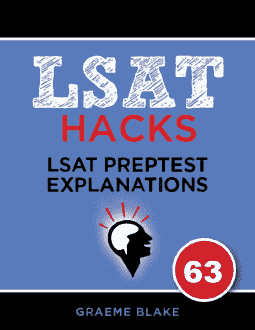QUESTION TEXT: Essayist: It is much less difficult to live an…
QUESTION TYPE: Principle – Strengthen
CONCLUSION: Everyone should be allowed to choose the people they want to associate with.
REASONING: It is easier to enjoy life if you can have your lifestyle choices accepted by others. It’s easier to get lifestyle choices accepted if you can choose your friends.
ANALYSIS: The argument is in favor of letting people choose their own associates. Among other things, it would make enjoying life easier.
The right answer supports this by showing that any freedom that makes enjoying life easier should be supported.
___________
- It would be possible to allow the freedom to make lifestyle choices but forbid the freedom to choose your associates. It will be a bit more difficult to live an enjoyable life…but you will still have the freedom to make lifestyle choices.
- Who knows? The stimulus just claims that we should have the freedom to associate with those who share our beliefs. But maybe not everyone actually ought to exercise that freedom.
- CORRECT. The freedom to choose your associates will make it easier to enjoy life. Therefore, according to this answer, no one should be denied that freedom.
- The stimulus is not just talking about people who depend on having friends and associates that will accept their personal beliefs. It’s also talking about people who would simply have an easier time enjoying life if they could choose associates who accept their beliefs.
- The stimulus is concluding that we should have the right to choose our associates: period. It shouldn’t matter whether we actually improve our life by doing so.


Maybe I’m missing something here, but I don’t see why E is inncorect.
E says “… If doing so COULD make easier to live an enjoyable life,” meaning that even if it does’nt in real time, as long as it COULD (by which the stimulus’s evidence says that it could anyway), then that it is all we need for E to be correct.
On principle justify questions, we need to directly support the conclusion. The conclusion here is: “Do not deny freedom”.
E only says “You *can* choose associates”. It doesn’t talk about whether you should deny freedom or not. Further, E only says you can make that choice if it helps you to have a better life. Whereas we need to support the conclusion that we should not have a denial under any circumstances.
Note: This is an old comment but I wanted to clarify the point.
Hi,
I don’t agree with the explanation for (E). There is a rather subtle, but decisive shift:
The argument’s conclusion says that NO ONE should be denied to have the freedom described, whereas, in (E), this freedom is only guaranteed to people for whom it would make it easier to live an enjoyable life (means it still leaves the possibility to still deny the freedom to people for whom this freedom will not be useful in terms of living a more enjoyable life).
I think you’re saying the same thing? When I say “it shouldn’t matter”, I mean that this is not what the conclusion was arguing for. The author wanted the absolute right, not a conditional right.